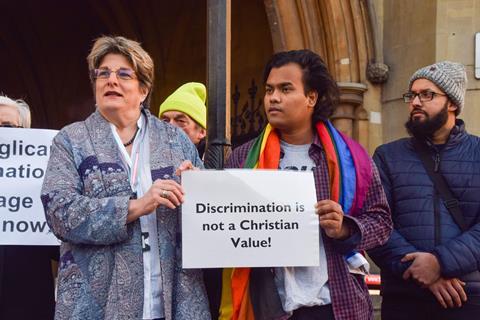LGBT campaigner, Jayne Ozanne has resigned from the Church of England Synod, in part over their failure to address whether sex outside of marriage is a salvation issue. Yes it is, says John Stevens, and to say otherwise is to deny people the opportunity to repent of their sin and receive eternal life

Recently, the Church of England General Synod voted (by a very narrow majority) to allow a trial of prayers to bless same-sex relationships. This compromise, a typical Anglican fudge, has, unsurprisingly, satisfied no one.
On the one hand, many evangelicals believe it amounts to a rejection of biblical authority and the authorisation of heresy within the Church. Others do not think it goes far enough, evidence that the Church of England remains institutionally homophobic and abusive towards gay people.
Now, Jayne Ozanne, one of the most vociferous campaigners for the Church to conduct same-sex marriages, has resigned from General Synod. In an interview with Pink News she said that she “can no longer in all conscience stay in an institution which continues to condone the abuse of [LBGT+] people.”
The Church’s purpose is to call people to repentance and faith
Critiquing the trial of prayers of blessing, she called it “a very small, begrudging step” that “doesn’t address the core issue [in the Church], which is whether sex outside of marriage is a salvation issue.”
The central question
Ozanne has, perhaps unwittingly, crystalised the crucial issue that faces not just the Church of England, but all churches and evangelical Christians. While much of the debate about same-sex relationships focuses on arguments about equality, inclusion, abuse and harm, the root issue is whether sexual behaviour is a salvation issue.
This determines whether attitudes towards same-sex relationships is a secondary matter on which evangelicals can reach different conclusions in conscience, or whether it is a primary issue which determines whether people are to be accepted as Christians at all.
If sex outside of marriage is a salvation issue, it follows that those who engage in such relationships remain under God’s judgement and are excluded from his gracious gift of eternal life. They should not therefore be regarded as members of the Church, and those who encourage such relationships are false teachers who ought to be silenced.
Facing the truth
I am glad that Ozanne has stated the issue with such clarity, as it is all too easy for evangelicals to avoid the stark reality of what is at stake in this debate. I am also glad that her comment refers to “sex outside marriage” more broadly, because this makes it clear that the issue is not just about gay relationships. But while Ozanne has identified the core question, the fundamental problem remains: How do we answer it?
For many in favour of same-sex relationships, this is a simple matter of equality and justice towards those who are in committed, loving relationships - whether heterosexual or homosexual. The inference is that, since God is love, he must be pleased by all loving human relationships.
But this cannot be the basis for determining what is right and true. Our supreme authority is the Bible, which we believe to be God’s word. To be a Christian is to be someone who submits and surrenders to Jesus as Lord, and therefore seeks to live in obedience to the rule of his word in every aspect of their life.
What does the Bible say?
When we turn to the Bible, it is unequivocal in its message that sex outside of marriage is a salvation issue. Sex was God’s gift to humanity in creation, but he designed it exclusively for use in the context of marriage between a man and a woman. This is reflected in the Old Testament law, the teaching of Jesus and the New Testament letters.
Sexual immorality, which scholars agree encompasses adultery, prostitution, sex outside of marriage and homosexual sex, is sinful. Those who engage in sexual immorality thereby demonstrate that they are outside of the kingdom of God, the sphere of salvation.
The inference is that, since God is love, he must be pleased by all loving relationships
Paul puts it especially clearly in 1 Corinthians 6:9-10: “Or do you not know that wrongdoers will not inherit the kingdom of God? Do not be deceived: Neither the sexually immoral, nor idolaters nor adulterers nor men who have sex with men nor thieves nor the greedy nor drunkards nor slanderers nor swindlers will inherit the kingdom of God.”
This is the consistent with teaching found elsewhere in the New Testament, including 1 Thessalonians 4:3-8 and Revelation 21:8.
Repent and believe
It is important to be clear that it is not sexual sin that disqualifies people from the kingdom of God, but the failure to repent and to receive the forgiveness Christ offers. To continue to live in sin, proudly refusing to repent, is a sure sign that a person is not in the kingdom. This is true not just for sexual sin, but other sins which are equally contrary to the clearly revealed will of God.
Those who wish to affirm same-sex relationships have to find ways to reject this teaching. Several interpretative strategies have been advocated to achieve this, none of which are convincing. Some have argued that the biblical teaching about homosexuality only concerns abusive relationships or that the passages refer to people who are by nature heterosexual but are experimenting with homosexuality.
These arguments have been largely discredited as exegetically and culturally unsustainable. Today, the main argument used is that the New Testament reveals a ‘redemptive trajectory’, and that God is saying something different to the Church today than he did 2,000 years ago. However, this argument entirely undermines the doctrine of scripture. Either the Bible was never the word of God, God lied about homosexuality in the past, or God has, for some undisclosed reason, changed his mind about homosexuality. Because of our views of what scripture is, no evangelical can accept such arguments.
False hope
As Christians and churches come under increasing pressure to compromise, we need to be clear about what is at stake. To allow people to think that they can enjoy forgiveness and the gift of eternal life while continuing in sexual sin is not loving. As Ozanne makes clear, this is not simply about homosexuality but all sex outside marriage. The Church cannot accept and affirm adultery, living together, hook-ups, friends-with-benefits, prostitution, pornography, polygamy or polyamory either.
Ozanne claims that it is abusive and dangerous for the Church to uphold biblical teaching about sex. However, the Church’s purpose is to call people to repentance and faith, so that we can all be conformed to the likeness of Christ (2 Corinthians 3:18). No one has a ‘right’ to inclusion in the Church on their own terms. Jesus has given the “keys to the kingdom of heaven” (Matthew 16:19) to his Church, and only those who repent and believe the good news are admitted (Mark 1:15).
Jesus came to seek and to save the lost (Luke 19:10), to call sinners to repentance, but he turned away those who would not repent and submit to his rule. The rich young ruler (Mark 10:17-27) wanted to enter the kingdom on his own terms, keeping hold of his wealth. Jesus turned him away. Was that abuse? No, it was a loving act. Jesus did not offer the false hope of salvation without repentance and faith.
Much more could be said about the need of the Church to reject homophobia, and the vital need to affirm, welcome and support same-sex attracted believers who are resisting temptation and struggling to live in obedience to Jesus’ teaching that sex is only for heterosexual marriage. They are true heroes of the faith. However, this piece only aims to answer the question that Ozanne posed, namely: Is sex outside marriage a salvation issue? Evangelicals are compelled to conclude that it is, and to contend against those who argue otherwise.







































6 Readers' comments